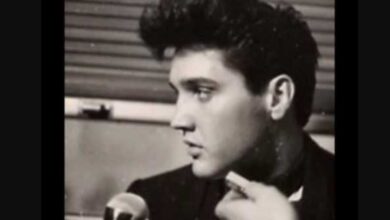Priscilla Says Elvis Pours His Heart Into This Song’s Performance
Elvis Presley, often hailed as the King of Rock and Roll, left an indelible mark on the music industry with his unparalleled talent, charisma, and stage presence. Born in Tupelo, Mississippi, in 1935, Elvis grew up surrounded by gospel music, blues, and country, which heavily influenced his own musical style. He burst onto the scene in the mid-1950s, shaking up the music world with his electrifying performances, distinctive voice, and irresistible charm.
Throughout his career, Elvis released a string of hits that became synonymous with the rock and roll era, including classics like “Heartbreak Hotel,” “Hound Dog,” and “Jailhouse Rock.” His dynamic fusion of rock, rhythm and blues, and gospel set him apart from his peers and earned him legions of devoted fans around the globe.
However, by the late 1960s, Elvis’ career had hit a bit of a slump. The rise of British Invasion bands and changing musical tastes had somewhat overshadowed his earlier success. In an effort to reignite his career, Elvis embarked on a comeback journey that would culminate in one of his most iconic performances.
The NBC television special, simply titled “Elvis,” aired in December 1968 and marked a pivotal moment in his career. Amidst a backdrop of swirling rumors and anticipation, Elvis took to the stage in a black leather outfit that exuded confidence and swagger. The special was divided into segments, including intimate acoustic sets and high-energy rock and roll numbers.
However, it was Elvis’ performance of “If I Can Dream” that stole the show and left a lasting impact on audiences. Backed by a full orchestra, Elvis delivered a soul-stirring rendition of the song that resonated deeply with viewers. The lyrics, penned by songwriter Walter Earl Brown, were inspired by Martin Luther King Jr.’s “I Have a Dream” speech and conveyed a powerful message of hope, unity, and resilience in the face of adversity.
As Elvis sang, his voice soared with emotion, conveying a sense of longing and determination that struck a chord with listeners. His impassioned delivery, coupled with the lush orchestral arrangement, created a transcendent musical experience that transcended boundaries and touched the hearts of millions.
The performance was not only a testament to Elvis’ vocal prowess but also his ability to connect with audiences on a profound level. In that moment, he transcended the confines of fame and celebrity, becoming a symbol of hope and inspiration for a generation.
In the years that followed, “If I Can Dream” became synonymous with Elvis’ comeback and remains one of his most enduring classics. Its timeless message continues to resonate with audiences of all ages, reaffirming Elvis’ status as a cultural icon and musical pioneer.
Though Elvis’ life was tragically cut short in 1977, his legacy lives on through his music, which continues to inspire and uplift generations of fans around the world. His impact on popular culture is immeasurable, and his influence can still be felt in the countless artists who cite him as a major inspiration.
In the end, Elvis Presley’s performance of “If I Can Dream” with a full orchestra stands as a shining example of his artistry and enduring legacy. It was a moment of triumph and redemption that solidified his status as one of the greatest performers of all time, leaving an indelible mark on the annals of music history.



